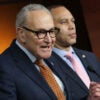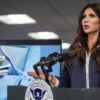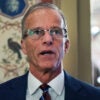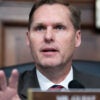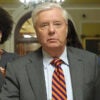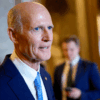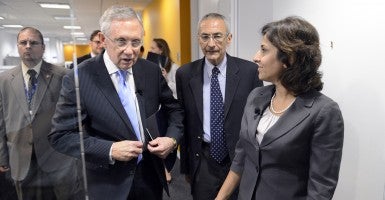I listened to progressive leaders for a full day last week—and learned they’ve got no new ideas to offer.
The speakers at the 2014 Policy Summit, hosted by the Center for American Progress, included Sen. Elizabeth Warren, D-Mass., New York Mayor Bill de Blasio, Sen. Cory Booker, D- N.J., United Nations Ambassador Samantha Power, and Department of Housing and Urban Development Secretary Julián Castro among the speakers explaining their plans for a progressive future.
After the widespread Democratic defeats in the recent midterm elections, had these liberals learned anything? Would they propose any new policies?
The short answer: no.
No one suggested that the midterm losses should prompt new policies, let alone a fundamental change in direction. Progressive sacred cows like climate change and income inequality dominated the discussion. Six years after Obama’s election, the progressive agenda does not appear to have progressed much at all.
A climate change panel included much consternation about why voters don’t care about climate change. Consensus emerged that progressives should begin framing the issue creatively. Indeed, billionaire investor Tom Steyer and Environmental Protection Agency Administrator Gina McCarthy contorted themselves trying to explain climate change as about everything except the environment. McCarthy even made the bold claim that climate change represents “the biggest public health and economic challenge of our time.”
This should not be confused with “the crisis of our time,” which is how CAP President Neera Tanden described the struggles of the middle-class. Yet progressive prescriptions for helping the middle-class were decidedly superficial. Warren delivered an impassioned speech in favor of the same tired policies which failed to interest voters two weeks ago. How should we save the middle-class? Warren repeated her calls for more regulation and higher taxes on the wealthy.
She was not the only speaker to believe that passion, rather than policy, was key. If Democrats had only been more proudly progressive, de Blasio insisted, voters would have supported them. Yet his own ideas suggest otherwise. When an audience member asked de Blasio for policy recommendations, he reiterated the same stale lines as Warren. Neither offered a new proposal that would directly ease the burden of middle-class families.
Most surprising were the topics that went undiscussed. Major issues like the collapse of the family among the poor and serious policy proposals like school choice, retirement savings accounts and expanded child-tax credits did not receive any substantial mention.
These topics have all gained currency the past few years and should at least enter our public policy debates. To ignore their existence, and instead offer vague platitudes about challenging ”wealthy interests,” appeared tone deaf, especially coming from an ambitious progressive roster which almost certainly included several future presidential hopefuls. Folksy metaphors about Main Street and Wall Street can take a party only so far.
The event was not entirely without its moments, however. Castro made the curious claim that he “think[s] of [Department of Housing and Urban Development] as the Department of Opportunity.” One wonders how he would describe other wasteful bureaucratic agencies. Would the Department of Energy be the Department of Possibility, perhaps?
The most revealing exchange occurred at the end of the sole panel devoted to foreign policy. Former Democratic Sen. Tom Daschle interviewed Samantha Power. With threats gathering upon the horizon, this was an opportunity for progressives to mobilize around a renewed message.
After 30 minutes discussing Ebola and the minutiae of multilateral negotiations, Daschle pointed out that they had run out of time to discuss ISIL, Syria or Ukraine. Never mind Iran, Russia or China. “Sorry for that,” Power replied. Three words have seldom captured an administration’s foreign policy so well.
